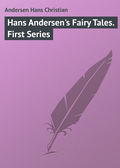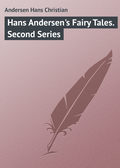
Ганс Христиан Андерсен
The Sand-Hills of Jutland
At dawn of day the wings of the storks were heard fluttering over the roof. During the night more than a hundred pairs of storks had been making their preparations, and now they flew up to wend their way to the south.
"Let all the males be ready," was the cry. "Let their mates and little ones join them."
"How light we feel!" said the young storks, who were all impatience to be off. "How charming to be able to travel to other lands!"
"Keep ye all together in one flock," cried the father and mother, "and don't chatter so much – it will take away your breath."
So they all flew away.
About the same time the blast of a horn sounding over the heath gave notice that the Viking had landed with all his men; they were returning home with rich booty from the Gallic coast, where the people, as in Britain, sang in their terror, —
"Save us from the savage Normands!"
What life and bustle were now apparent in the Viking's castle near "the wild morass!" Casks of mead were brought into the hall, the pile of wood was lighted, and horses were slaughtered for the grand feast which was to be prepared. The sacrificial priests sprinkled with the horses' warm blood the slaves who were to assist in the offering. The fires crackled, the smoke rolled up under the roof, the soot dropped from the beams; but people were accustomed to that. Guests were invited, and they brought handsome gifts; rancour and falseness were forgotten – they all became drunk together, and they thrust their doubled fists into each other's faces – which was a sign of good-humour. The skald – he was a sort of poet and musician, but at the same time a warrior – who had been with them, and had witnessed what he sang about, gave them a song, wherein they heard recounted all their achievements in battle, and wonderful adventures. At the end of every verse came the same refrain, —
"Fortune dies, friends die, one dies one's self; but a glorious name never dies."
And then they all struck on their shields, and thundered with their knives or their knuckle-bones on the table, so that they made a tremendous noise.
The Viking's wife sat on the cross bench in the open banquet hall. She wore a silk dress, gold bracelets, and large amber beads. She was in her grandest attire, and the skald named her also in his song, and spoke of the golden treasure she had brought her husband; and he rejoiced in the lovely child he had only seen by daylight, in all its wondrous beauty. The fierce temper which accompanied her exterior charms pleased him. "She might become," he said, "a stalwart female warrior, and able to kill a giant adversary." She never even blinked her eyes when a practised hand, in sport, cut off her eyebrows with a sharp sword.
The mead casks were emptied, others were brought up, and these, too, were drained; for there were folks present who could stand a good deal. To them might have been applied the old proverb, "The cattle know when to leave the pasture; but an unwise man never knows the depth of his stomach."
Yes, they all knew it; but people often know the right thing, and do the wrong. They knew also that "one wears out one's welcome when one stays too long in another man's house;" but they remained there for all that. Meat and mead are good things. All went on merrily, and towards night the slaves slept amidst the warm ashes, and dipped their fingers into the fat skimmings of the soup, and licked them. It was a rare time!
And again the Viking went forth on an expedition, notwithstanding the stormy weather. He went after the crops were gathered in. He went with his men to the coast of Britain – "it was only across the water," he said – and his wife remained at home with her little girl; and it was soon to be seen that the foster-mother cared almost more for the poor frog, with the honest eyes and plaintive croaking, than for the beauty who scratched and bit everybody around.
The raw, damp, autumn, mist, that loosens the leaves from the trees, lay over wood and hedge; "Birdfeatherless," as the snow is called, was falling thickly; winter was close at hand. The sparrows seized upon the storks' nest, and talked over, in their fashion, the absent owners. They themselves, the stork pair, with all their young ones, where were they now?
The storks were now in the land of Egypt, where the sun was shining warmly as with us on a lovely summer day. The tamarind and the acacia grew there; the moonbeams streamed over the temples of Mahomet. On the slender minarets sat many a pair of storks, reposing after their long journey; the whole immense flock had fixed themselves, nest by nest, amidst the mighty pillars and broken porticos of temples and forgotten edifices. The date tree elevated to a great height its broad leafy roof, as if it wished to form a shelter from the sun. The grey pyramids stood with their outlines sharply defined in the clear air towards the desert, where the ostrich knew he could use his legs; and the lion sat with his large grave eyes, and gazed on the marble sphinxes that lay half imbedded in the sand. The waters of the Nile had receded, and a great part of the bed of the river was swarming with frogs; and that, to the stork family, was the pleasantest sight in the country where they had arrived. The young ones were astonished at all they saw.
"Such are the sights here, and thus it always is in our warm country," said the stork-mother good-humouredly.
"Is there yet more to be seen?" they asked. "Shall we go much further into the country?"
"There is nothing more worth seeing," replied the stork-mother. "Beyond this luxuriant neighbourhood there is nothing but wild forests, where the trees grow close to each other, and are still more closely entangled by prickly creeping plants, weaving such a wall of verdure, that only the elephant, with his strong clumsy feet, can there tread his way. The snakes are too large for us there, and the lizards too lively. If ye would go to the desert, ye will meet with nothing but sand; it will fill your eyes, it will come in gusts, and cover your feathers. No, it is best here. Here are frogs and grass-hoppers. I shall remain here, and so shall you."
And they remained. The old ones sat in their nest upon the graceful minaret; they reposed themselves, and yet they had enough to do to smooth their wings and rub their beaks on their red stockings; and they stretched out their necks, saluted gravely, and lifted up their heads with their high foreheads and fine soft feathers, and their brown eyes looked so wise.
The female young ones strutted about proudly among the juicy reeds, stole sly glances at the other young storks, made acquaintances, and slaughtered a frog at every third step, or went lounging about with little snakes in their bills, which they fancied looked well, and which they knew would taste well.
The male young ones got into quarrels; struck each other with their wings; pecked at each other with their beaks, even until blood flowed. Then they all thought of engaging themselves – the male and the female young ones. It was for that they lived, and they built nests, and got again into new quarrels; for in these warm countries every one is so hot-headed. Nevertheless they were very happy, and this was a great joy to the old storks. Every day there was warm sunshine – every day plenty to eat. They had nothing to think of except pleasure. But yonder, within the splendid palace of their Egyptian host, as they called him, there was but little pleasure to be found.
The wealthy, mighty chief lay upon his couch, stiffened in all his limbs – stretched out like a mummy in the centre of the grand saloon with the many-coloured painted walls: it was as if he were lying in a tulip. Kinsmen and servants stood around him. Dead he was not, yet it could hardly be said that he lived. The healing bog-flower from the faraway lands in the north – that which she was to have sought and plucked for him – she who loved him best – would never now be brought. His beautiful young daughter, who in the magic garb of a swan had flown over sea and land away to the distant north, would never more return. "She is dead and gone," had the two swan ladies, her companions, declared on their return home. They had concocted a tale, and they told it as follows: —
"We had flown all three high up in the air when a sportsman saw us, and shot at us with his arrow. It struck our young friend; and, slowly singing her farewell song, she sank like a dying swan down into the midst of the lake in the wood. There, on its banks, under a fragrant weeping birch tree, we buried her. But we took a just revenge: we bound fire under the wings of the swallow that built under the sportman's thatched roof. It kindled – his house was soon in flames – he was burned within it – and the flames shone as far over the sea as to the drooping birch, where she is now earth within the earth. Alas! never will she return to the land of Egypt."
And they both wept bitterly; and the old stork-father, when he heard it, rubbed his bill until it was quite sore.
"Lies and deceit!" he cried. "I should like, above all things, to run my beak into their breasts."
"And break it off," said the stork-mother; "you would look remarkably well then. Think first of yourself, and the interests of your own family; everything else is of little consequence."
"I will, however, place myself upon the edge of the open cupola to-morrow, when all the learned and the wise are to assemble to take the case of the sick man into consideration: perhaps they may then arrive a little nearer to the truth."
And the learned and the wise met together, and talked much, deeply, and profoundly of which the stork could make nothing at all; and, sooth to say, there was no result obtained from all this talking, either for the invalid or for his daughter in "the wild morass;" yet, nevertheless, it was all very well to listen to – one must listen to a great deal in this world.
But now it were best, perhaps, for us to hear what had happened formerly. We shall then be better acquainted with the story – at least, we shall know as much as the stork-father did.
"Love bestows life; the highest love bestows the highest life; it is only through love that his life can be saved," was what had been said; and it was amazingly wisely and well said, the learned declared.
"It is a beautiful thought," said the stork-father.
"I don't quite comprehend it," said the stork-mother, "but that is not my fault – it is the fault of the thought; though it is all one to me, for I have other things to think upon."
And then the learned talked of love between this and that – that there was a difference. Love such as lovers felt, and that between parents and children; between light and plants; how the sunbeams kissed the ground, and how thereby the seeds sprouted forth – it was all so diffusely and learnedly expounded, that it was impossible for the stork-father to follow the discourse, much less to repeat it. It made him very thoughtful, however; he half closed his eyes, and actually stood on one leg the whole of the next day, reflecting on what he had heard. So much learning was difficult for him to digest.
But this much the stork-father understood. He had heard both common people and great people speak as if they really felt it, that it was a great misfortune to many thousands, and to the country in general, that the king lay so ill, and that nothing could be done to bring about his recovery. It would be a joy and a blessing to all if he could but be restored to health.
"But where grew the health-giving flower that might cure him?" Everybody asked that question. Scientific writings were searched, the glittering stars were consulted, the wind and the weather. Every traveller that could be found was appealed to, until at length the learned and the wise, as before stated, pitched upon this: "Love bestows life – life to a father." And though this dictum was really not understood by themselves, they adopted it, and wrote it out as a prescription. "Love bestows life" – well and good. But how was this to be applied? Here they were at a stand. At length, however, they agreed that the princess must be the means of procuring the necessary help, as she loved her father with all her heart and soul. They also agreed on a mode of proceeding. It is more than a year and a day since then. They settled that when the new moon had just disappeared, she was to betake herself by night to the marble sphinx in the desert, to remove the sand from the entrance with her foot, and then to follow one of the long passages which led to the centre of the great pyramids, where one of the most mighty monarchs of ancient times, surrounded by splendour and magnificence, lay in his mummy-coffin. There she was to lean her head over the corpse, and then it would be revealed to her where life and health for her father were to be found.
All this she had performed, and in a dream had been instructed that from the deep morass high up in the Danish land – the place was minutely described to her – she might bring home a certain lotus flower, which beneath the water would touch her breast, that would cure him.
And therefore she had flown, in the magical disguise of a swan, from Egypt up to "the wild morass." All this was well known to the stork-father and the stork-mother; and now, though rather late, we also know it. We know that the mud-king dragged her down with him, and that, as far as regarded her home, she was dead and gone; only the wisest of them all said, like the stork-mother, "She can take care of herself;" and, knowing no better, they waited to see what would turn up.
"I think I shall steal their swan garbs from the two wicked princesses," said the stork-father; "then they will not be able to go to 'the wild morass' and do mischief. I shall leave the swan disguises themselves up yonder till there is some use for them."
"Where could you keep them?" asked the old female stork.
"In our nest near 'the wild morass,'" he replied. "I and our eldest young ones can carry them; and if we find them too troublesome, there are plenty of places on the way where we can hide them until our next flight. One swan's dress would be enough for her, to be sure; but two are better. It is a good thing to have abundant means of travelling at command in a country so far north."
"You will get no thanks for what you propose doing," said the stork-mother; "but you are the master, and must please yourself. I have nothing to say except at hatching-time."
At the Viking's castle near "the wild morass," whither the storks were flying in the spring, the little girl had received her name. She was called Helga; but this name was too soft for one with such dispositions as that lovely creature had. She grew fast month by month; and in a few years, even while the storks were making their habitual journeys in autumn towards the Nile, in spring towards "the wild morass," the little child had grown up into a big girl, and before any one could have thought it, she was in her sixteenth year, and a most beautiful young lady – charming in appearance, but hard and fierce in temper – the most savage of the savage in that gloomy, cruel time.
It was a pleasure to her to sprinkle with her white hands the reeking blood of the horse slaughtered for an offering. She would bite, in her barbarous sport, the neck of the black-cock which was to be slaughtered by the sacrificial priest; and to her foster-father she said in positive earnestness, —
"If your enemy were to come and cast ropes over the beams that support the roof, and drag them down upon your chamber whilst you were sleeping, I would not awaken you if I could – I would not hear it – the blood would tingle as it does now in that ear on which, years ago, you dared to give me a blow. I remember it well."
But the Viking did not believe she spoke seriously. Like every one else, he was fascinated by her extreme beauty, and never troubled himself to observe if the mind of little Helga were in unison with her looks. She would sit on horseback without a saddle, as if grown fast to the animal, and go at full gallop; nor would she spring off, even if her horse and other ill-natured ones were biting each other. Entirely dressed as she was, she would cast herself from the bank into the strong current of the fiord, and swim out to meet the Viking when his boat was approaching the land. Of her thick, splendid hair she had cut off the longest lock, and plaited for herself a string to her bow.
"Self-made is well made," she said.
The Viking's wife, according to the manners and customs of the age in which she lived, was strong in mind, and decided in purpose; but with her daughter she was like a soft, timid woman. She was well aware that the dreadful child was under the influence of sorcery.
And Helga apparently took a malicious pleasure in frightening her mother. Often when the latter was standing on the balcony, or walking in the courtyard, Helga would place herself on the side of the well, throw her arms up in the air, and then let herself fall headlong into the narrow, deep hole, where, with her frog nature, she would duck and raise herself up again, and then crawl up as if she had been a cat, and run dripping of water into the grand saloon, so that the green rushes which were strewed over the floor partook of the wet stream.
There was but one restraint upon little Helga – that was the evening twilight. In it she became quiet and thoughtful – would allow herself to be called and guided; then too, she would seem to feel some affection for her mother; and when the sun sank, and the outer and inward change took place, she would sit still and sorrowful, shrivelled up into the form of a frog, though the head was now much larger than that little animal's, and therefore she was uglier than ever: she looked like a miserable dwarf, with a frog's head and webbed fingers. There was something very sad in her eyes; voice she had none except a kind of croak like a child sobbing in its dreams. Then would the Viking's wife take her in her lap; she would forget the ugly form, and look only at the melancholy eyes; and more than once she exclaimed, —
"I could almost wish that thou wert always my dumb fairy-child, for thou art more fearful to look at when thy form resumes its beauty."
And she wrote Runic rhymes against enchantment and infirmity, and threw them over the poor creature; but there was no change for the better.
"One could hardly believe that she was once so small as to lie in the calyx of a water-lily," said the stork-father. "She is now quite a woman, and the image of her Egyptian mother. Her, alas! we have never seen again. She did not take good care of herself, as thou didst expect and the learned people predicted. Year after year I have flown backwards and forwards over 'the wild morass,' but never have I seen a sign of her. Yes, I can assure thee, during the years we have been coming up here, when I have arrived some days before thee, that I might mend the nest and set everything in order in it, I have for a whole night flown, as if I had been an owl or a bat, continually over the open water, but to no purpose. We have had no use either for the two swan disguises which I and the young ones dragged all the way up here from the banks of the Nile. It was hard enough work, and it took us three journeys to bring them up. They have now lain here for years at the bottom of our nest; and should a fire by any chance break out, and the Viking's house be burned down, they would be lost."
"And our good nest would be lost," said the old female stork; "but thou thinkest less of that than of these feather things and thy bog princess. Thou hadst better go down to her at once, and remain in the mire. Thou art a hard-hearted father to thine own: that I have said since I laid my first eggs. What if I or one of our young ones should get an arrow under our wings from that fierce crazy brat at the Viking's? She does not care what she does. This has been much longer our home than hers, she ought to recollect. We do not forget our duty; we pay our rent every year – a feather, an egg, and a young one – as we ought to do. Dost thou think that when she is outside I can venture to go below, as in former days, or as I do in Egypt, where I am almost everybody's comrade, not to mention that I can there even peep into the pots and pans without any fear? No; I sit up here and fret myself about her – the hussy! and I fret myself at thee too. Thou shouldst have left her lying in the water-lily, and there would have been an end of her."
"Thy words are much harder than thy heart," said the stork-father. "I know thee better than thou knowest thyself."
And then he made a hop, flapped his wings twice, stretched his legs out behind him, and away he flew, or rather sailed, without moving his wings, until he had got to some distance. Then he brought his wings into play; the sun shone upon his white feathers; he stretched his head and his neck forward, and hastened on his way.
"He is, nevertheless, still the handsomest of them all," said his admiring mate; "but I will not tell him that."
Late that autumn the Viking returned home, bringing with him booty and prisoners. Among these was a young Christian priest, one of the men who denounced the gods of the Northern mythology. Often about this time was the new religion talked of in baronial halls and ladies' bowers – the religion that was spreading over all lands of the south, and which, with the holy Ansgarius,2 had even reached as far as Hedeby. Even little Helga had heard of the pure religion of Christ, who, from love to mankind, had given himself as a sacrifice to save them; but with her it went in at one ear and out at the other, to use a common saying. The word love alone seemed to have made some impression upon her, when she shrunk into the miserable form of a frog in the closed-up chamber. But the Viking's wife had listened to, and felt herself wonderfully affected by, the rumour and the Saga about the Son of the one only true God.
The men, returning from their expedition, had told of the splendid temples of costly hewn stone raised to Him whose errand was love. A pair of heavy golden vessels, beautifully wrought out of pure gold, were brought home, and both had a charming, spicy perfume. They were the censers which the Christian priests swung before the altars, on which blood never flowed; but wine and the consecrated bread were changed into the blood of Him who had given himself for generations yet unborn.
To the deep, stone-walled cellars of the Viking's loghouse was the young captive, the Christian priest, consigned, fettered with cords round his feet and his hands. He was as beautiful as Baldur to look at, said the Viking's wife, and she was grieved at his fate; but young Helga wished that he should be ham-strung, and bound to the tails of wild oxen.
"Then I should let loose the dogs. Halloo! Then away over bogs and pools to the naked heath. Hah! that would be something pleasant to see – still pleasanter to follow him on the wild journey."
But the Viking would not hear of his being put to such a death. On the morrow, as a scoffer and denier of the high gods, he was to be offered up as a sacrifice to them upon the blood stone in the sacred grove. He was to be the first human sacrifice ever offered up there.
Young Helga prayed that she might be allowed to sprinkle with the blood of the captive the images of the gods and the assembled spectators. She sharpened her gleaming knife, and, as one of the large ferocious dogs, of which there were plenty in the courtyard, leaped over her feet, she stuck the knife into his side.
"That is to prove the blade," she exclaimed.
And the Viking's wife was shocked at the savage-tempered, evil-minded girl; and when night came, and the beauteous form and the disposition of her daughter changed, she poured forth her sorrow to her in warm words, which came from the bottom of her heart.
The hideous frog with the ogre head stood before her, and fixed its brown sad eyes upon her, listened, and seemed to understand with a human being's intellect.
"Never, even to my husband, have I hinted at the double sufferings I have through you," said the Viking's wife. "There is more sorrow in my heart on your account than I could have believed. Great is a mother's love. But love never enters your mind. Your heart is like a lump of cold hard mud. From whence did you come to my house?"
Then the ugly shape trembled violently; it seemed as if these words touched an invisible tie between the body and the soul – large tears started to its eyes.
"Your time of trouble will come some day, depend on it," said the Viking's wife, "and dreadful will it also be for me. Better had it been that you had been put out on the highway, and the chillness of the night had benumbed you until you slept in death;" and the Viking's wife wept salt tears, and went angry and distressed away, passing round behind the loose skin partition that hung over an upper beam to divide the chamber.
Alone in a corner sat the shrivelled frog. She was mute, but after a short interval she uttered a sort of half-suppressed sigh. It was as if in sorrow a new life had awoke in some nook of her heart. She took a step forward, listened, advanced again, and grasping with her awkward hands the heavy bar that was placed across the door, she removed it softly, and quietly drew away the pin that was stuck in over the latch. She then seized the lighted lamp that stood in the room beyond: it seemed as if a great resolution had given her strength. She made her way down to the dungeon, drew back the iron bolt that fastened the trap-door, and slid down to where the prisoner was lying. He was sleeping. She touched him with her cold, clammy hand; and when he awoke, and beheld the disgusting creature, he shuddered as if he had seen an evil apparition. She drew her knife, severed his bonds, and beckoned to him to follow her.
He named holy names, made the sign of the cross, and when the strange shape stood without moving, he exclaimed, in the words of the Bible, —
"'Blessed is he that considereth the poor: the Lord will deliver him in time of trouble.' Who art thou? How comes it that, under the exterior of such an animal, there is so much compassionate feeling?"
The frog beckoned to him, and led him, behind tapestry that concealed him, through private passages out to the stables, and pointed to a horse. He sprang on it, and she also jumped up; and, placing herself before him, she held by the animal's mane. The prisoner understood her movement; and at full gallop they rode, by a path he never could have found, away to the open heath.
He forgot her ugly form – he knew that the grace and mercy of God could be evinced even by means of hobgoblins – he put up earnest prayers, and sang holy hymns. She trembled. Was it the power of the prayers and hymns that affected her thus? or was it a cold shivering at the approach of morning, that was about to dawn? What was it that she felt? She raised herself up into the air, attempted to stop the horse, and was on the point of leaping down; but the Christian priest held her fast with all his might, and chanted a psalm, which he thought would have sufficient strength to overcome the influence of the witchcraft under which she was kept in the hideous disguise of a frog. And the horse dashed more wildly forward, the heavens became red, the first ray of the sun burst forth through the morning sky, and with that clear gush of light came the miraculous change – she was the young beauty, with the cruel, demoniacal spirit. The astonished priest held the loveliest maiden in his arms he had ever beheld; but he was horror-struck, and, springing from the horse, he stopped it, expecting to see it also the victim of some fearful sorcery. Young Helga sprang at the same moment to the ground, her short childlike dress reaching no lower than her knees. Suddenly she drew her sharp knife from her belt, and rushed furiously upon him.
"Let me but reach thee – let me but reach thee, and my knife shall find its way to thy heart. Thou art pale in thy terror, beardless slave!"
She closed with him; a severe struggle ensued, but it seemed as if some invincible power bestowed strength upon the Christian priest. He held her fast; and the old oak tree close by came to his assistance by binding down her feet with its roots, which were half loosened from the earth, her feet having slid under them. There was a fountain near, and he splashed the clear, fresh water over her face and neck, commanding the unclean spirit to pass out of her, and signed her according to the Christian rites; but the baptismal water had no power where the fountain of belief had not streamed upon the heart.
Yet still he was the victor. Yes, more than human strength could have accomplished against the powers of evil lay in his acts, which, as it were, overpowered her. She suffered her arms to sink, and gazed with wondering looks and blanched cheeks upon the man whom she deemed some mighty wizard, strong in sorcery and the black art. These were mystic Rhunes he had recited, and magic characters he had traced in the air. Not for the glancing axe or the well-sharpened knife, if he had brandished these before her eyes, would they have blinked, or would she have winced; but she winced now when he made the sign of the cross upon her brow and bosom, and she stood now like a tame bird, her head bowed down upon her breast.
Then he spoke kindly to her of the work of mercy she had performed towards him that night, when, in the ugly disguise of a frog, she had come to him, had loosened his bonds, and brought him forth to light and life. She also was bound – bound even with stronger fetters than he had been, he said; but she also should be set free, and like him attain to light and life. He would take her to Hedeby, to the holy Ansgarius. There, in the Christian city, the witchcraft in which she was held would be exorcised; but not before him must she sit on horseback, even if she wished it herself – he dared not place her there.







